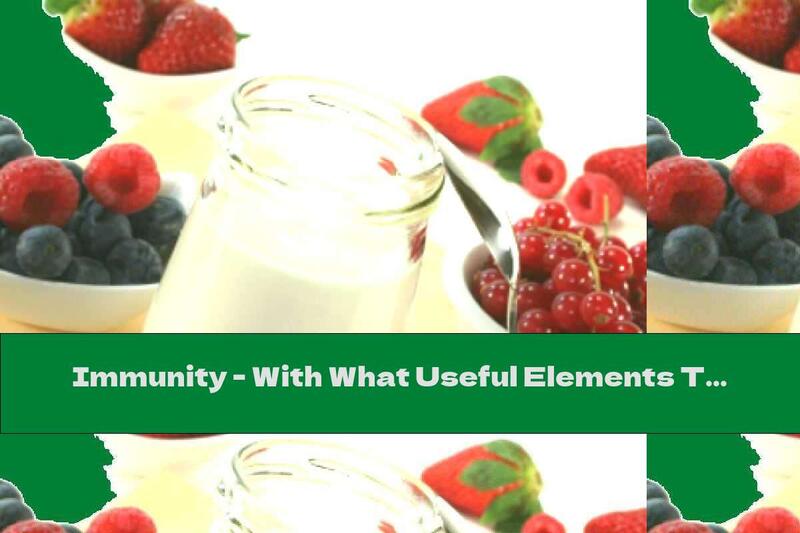Immunity - With What Useful Elements To Strengthen It?
 Author: Victoria Aly
Time for reading: ~2
minutes
Last Updated:
August 08, 2022
Author: Victoria Aly
Time for reading: ~2
minutes
Last Updated:
August 08, 2022

In this article, learn more about Immunity - With What Useful Elements To Strengthen It?. It is important to get through the diet ....
To perform its functions, the immune system needs a complete and balanced diet. One of the steps to maintain the production of its agents is through regular intake of the necessary building blocks and other useful substances. It is no coincidence that the starving suffer more often from infectious diseases. This should be kept in mind when embarking on a weight loss diet and building our own eating habits. Although there is still no scientific evidence that deficiencies in certain nutrients contribute to more frequent illness, the results of even a small number of scientific studies on the effects of food on the immune system suggest that they are relevant to the onset and development of diseases.
For example, clinical trials on how dietary changes affect the immune system have found that a low-protein diet reduces the number of active T cells and macrophages , as well as reduced immunoglobulin A (IgA) production - all of which are "agents." “Of the immune system.
Deficiency of zinc, selenium, iron, copper, folic acid, vitamins A, B 6 , C and E also reflects the strength of the defenses .
Selenium deficiency in food puts at increased risk of cancer of the bladder, breast, colon, prostate and lung. A large-scale scientific study found that the intake of selenium and vitamin E.in combination it has a preventive effect against prostate cancer . Vitamin A has
been known for decades to play an important role in fighting infections and maintaining mucous membranes, affecting T and B cells and cytokines. Vitamin A deficiency weakens the immune system and increases the risk of infectious diseases. The same is true in the absence of vitamin B 2 in terms of susceptibility to bacterial infections. However, the mechanism by which this deficiency affects the immune response is still unclear. Deficiency of vitamin B 6 also influences the immune response, and in particular of the maturation of lymphocytes
and the formation of T and B cells. Studies show that taking the necessary daily amounts of the vitamin supports the immune system. However, overdose of supplements does not bring health benefits, but on the contrary there is evidence of its relationship with the formation of tumor formations.
We have known since childhood how useful vitamin C is and how it is actually obtained through food. However, its action is proven mainly when taken in combination with other useful substances than taken alone.
It is known that exposure to sunlight our skin synthesizes vitamin D . Some time ago, scientists observed an improvement in the condition of patients with tuberculosis when exposed to the sun. From both facts it is concluded that the vitamin suppresses the bacterium causing this disease, Mycobacterium tuberculosis, bacteria on Koch. The antimicrobial effect of the vitamin is still being studied, as well as its benefits against other diseases. In recent years, data on the benefits of the vitamin for one or another aspect of health are constantly coming out, but apart from its proven effect from its use as a prophylactic measure against rickets, there is no other accepted by the medical community.
A clinical study found that taking vitamin E of 200 mg per day increased the body's resistance to hepatitis B and tetanus, but after immunization against these diseases.
Zinc is an important building block for the cells of the immune system and its deficiency reflects on the ability of T and some other cells to perform their functions. However, the useful daily dose of zinc varies between 15 and 25 mg per day. Larger amounts have the exact opposite effect on the immune system.
Related Articles
- Nutrition for Respiratory Health: Supporting Your Lungs with the Right Foods
- Boost Digestive Health with Buffer 500 - Benefits & Recipes
- The Truth About E477 in Food: What You Need to Know
- The Nutritional Value of Potato Chips: What You Need to Know
- Boost Your Health with Buffer 500: Benefits, Recipes, and More
Top Nutrition Articles Today
- . The Latest Food Pyramid: A Guide to Balanced Nutrition
- . The Role of Hydrochloric Acid in Digestion: A Comprehensive...
- . The Importance of Nutrition Conferences: Promoting Awareness...
- . The Complete Guide to E471 in Nutrition and Food Products
- . Understanding Emulsifier 472 (E472a) in Nutrition: Functions...
- . The Ultimate Guide to the Food Pyramid in Nutrition: Benefit...
- . Hydrochloric Acid in Digestion: Importance, Symptoms, and Na...
- . Chicory: 15 Health Benefits, How To Drink, Contraindications...
- . The Role of K12 in Nutrition: Benefits, Sources, and Recomme...
- . The Benefits of Myra E: A Powerful Vitamin E Supplement